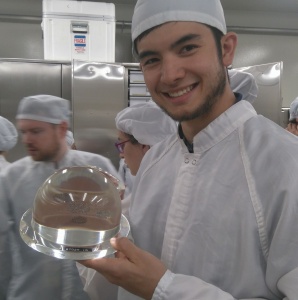EPEC Profiles – Gavin Tolometti
In this series from the EPEC Communication Working Group, we meet members of the Europlanet Early Career (EPEC) community and find out more about their experiences and aspirations.
Gavin Tolometti is a PhD student at the University of Western Ontario and uses radar data to study the surface roughness of lava flows on Earth, the Moon and Mars.
As a kid, I always found volcanoes, lava flows and magma in general incredibly interesting! However, once I realised other planetary bodies in our solar system, including our own natural satellite, have lava flows I was convinced that planetary science was the field for me.
It took a while to get on to a planetary science path. I started with a bachelors degree in geology, and it was not until the final year of my undergraduate degree in 2016 that I learned I could study lava flows for a PhD!
My study focuses on using radar remote sensing data to study the surface roughness of lava flows on Earth, the Moon and Mars. The surface roughness of a lava flow provides us a window into learning about the emplacement styles of lava flows on other planetary bodies, which can inform us about the eruption dynamics and thermal properties of planetary interiors. I use radar data collected by airbourne platforms and Earth orbiting satellites, including the ESA Sentinel-1 satellite and the Jet Propulsion Laboratory Unmanned Aerial Vehicle Synthetic Aperture Radar platform.
My PhD has taken me to some very exciting locations, including Craters of the Moon National Monument and Preserve in Idaho, USA and the 2014-15 Holuhraun lava flow-field in central Iceland. Iceland is my most memorable experience conducting field work because I was given the role as logistics lead. I had to ensure the safety of my team and lead a field expedition funded by the Canadian Space Agency. It was also the first time I had visited Iceland and driven a vehicle through a river (nervously!) to reach our field site.

I have also been involved in two high fidelity analogue sample return missions. In 2016, I was part of the CanMars 2016 Sample Return Mission field team where we were tasked to simulate a rover on Mars searching for organic sediments. This included using geochemical and hyperspectral handheld field instruments to analyse sedimentary rocks in Utah, similar to the instruments attached to the Mars Science Laboratory Curiosity mission. In 2019, I was part of the CanMoon Sample Return Mission planning team where we simulated a sample return mission on the Moon in preparation for the NASA Artemis Lunar Gateway initiative.
As well as my research, I am also involved in science communication on social media and I am part of a graduate student podcast committee group known as “GradCast” at the University of Western Ontario. I got into listening to podcasts at the start of my PhD, but I never thought I would get to participate in a podcast and learn about the amazing research conducted by other students in different departments.
My interests in podcasting and science communication has me on a path to strengthen the bridge between STEAM and the public. Learning how to best communicate ground breaking scientific discoveries, discuss important news, and share our passion for fields in Science, Technology, Engineering, Arts and Mathematics (STEAM) with the public will benefit not only ourselves, but the entire world.
“Getting involved with EPEC has been extremely rewarding as I have gotten to meet and work with many incredible researchers. I will continue to become more involved with EPEC and contribute to the society using my science communication and research skills.”
Gavin Tolometti
More information about Gavin Tolometti:
Contact: gtolomet@uwo.ca

If you are an Early Career member of the Europlanet Society and would like to be featured in an EPEC Profile, find out more about how to submit your profile.
See all the EPEC Profiles.

